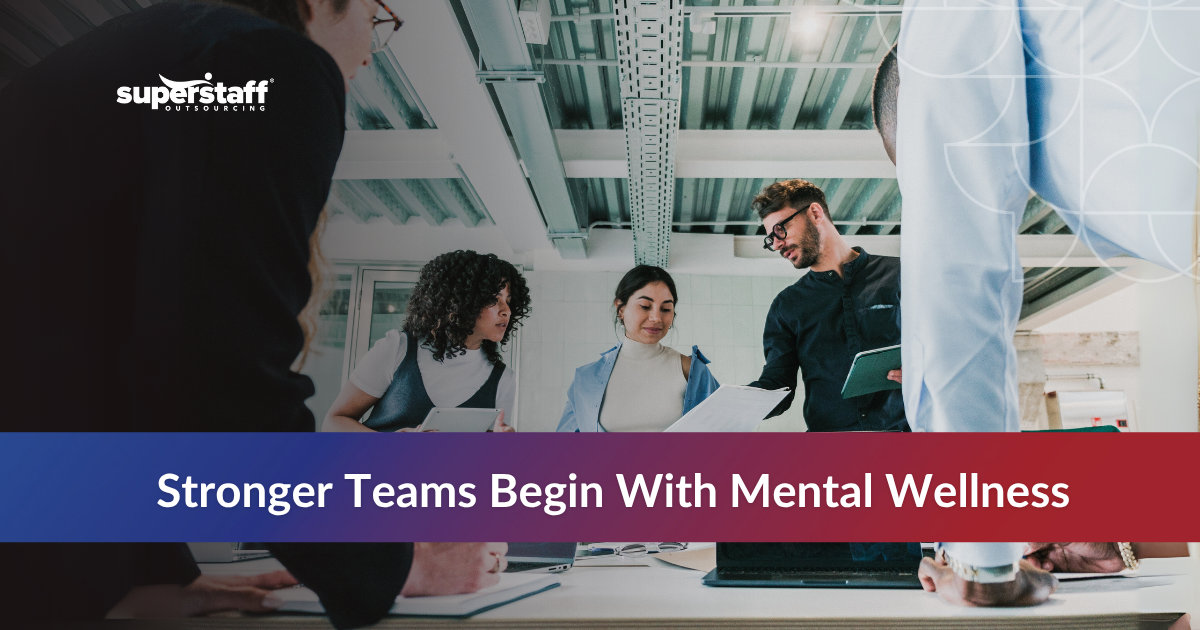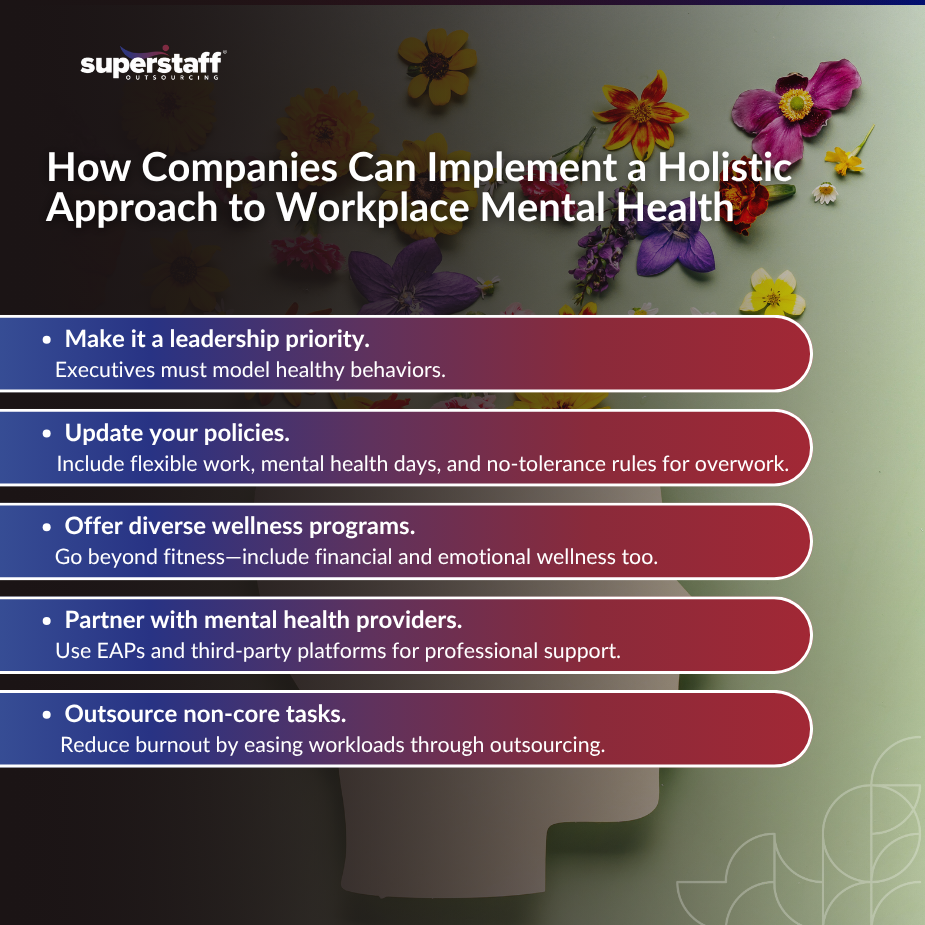
Workplace mental health can’t be solved with a meditation app alone. While wellness perks like yoga sessions, mindfulness tools, and free lunches may look good on paper, they often fail to address the deeper challenges employees face—chronic stress, emotional fatigue, and a growing sense of disconnection.
Today’s workforce is under immense pressure. From the constant churn of digital communication to economic uncertainty and shifting job expectations, employees are experiencing burnout at record levels. Turnover is rising, engagement is declining, and the old models of workplace well-being no longer cut it. In response, forward-thinking companies are reimagining how they care for their people, not as a side benefit, but as a core business strategy.
To truly support workplace mental health, companies must go beyond surface-level initiatives and adopt a more holistic approach. This means reshaping company culture, investing in people-first policies, and leveraging strategic outsourcing to scale support and reduce internal pressure.
In this blog, we explore how businesses can create a comprehensive mental health strategy that meets the demands of today’s fast-paced, high-stakes work environment while building stronger, more resilient teams.
Workplace mental health must be treated as a strategic priority, not a side project.
According to recent research, 84% of employees say the condition of their workplace directly contributes to their mental health challenges. Additionally, 81% prefer seeking employers who provide comprehensive mental health support.
Supporting employee mental health begins at the top. When executives take mental health seriously, not just during awareness months, but all year round, it sends a powerful message. CEOs and HR leaders must embed mental health into the fabric of the organization by aligning it with business goals and leadership expectations.
Leadership modeling mental health practices is essential. When senior leaders take mental health days, openly discuss stress management, and respect boundaries, they normalize care and encourage others to do the same.
Manager training in empathy and recognition also makes a significant impact. People managers must be equipped with soft skills to recognize signs of burnout, respond compassionately, and validate team members without judgment. Training should include how to have supportive conversations, offer flexibility, and refer employees to professional help.
Mental health goals tied to retention and productivity help integrate well-being into performance metrics. For instance, tracking the impact of wellness initiatives on turnover or absenteeism links mental health to business outcomes and encourages continuous investment.
Once the leadership is aligned, companies can start building systems that support employees at every level.
Build proactive policies that support emotional, mental, and psychological safety.
Policy change is a powerful tool for improving mental health outcomes. Unlike perks that may only benefit some, policies set expectations and protections for all. When designed with care, HR mental health strategies create a lasting impact across the entire workforce.
Flexible work and PTO policies empower employees to take care of themselves when they need it most. Whether through remote work, compressed workweeks, or asynchronous hours, flexibility reduces stress and improves work-life balance.
Non-punitive sick leave for mental health days sends a clear message that emotional wellness matters just as much as physical health. Encourage employees to take time off when they’re feeling overwhelmed, without fear of repercussions or guilt.
Zero-tolerance policies on harassment and overwork are essential to maintaining a psychologically safe workplace. Boundaries around working hours, the right to disconnect, and accountability for toxic behaviors help create a culture where people feel respected and safe.
But policy is only one part of the puzzle—daily support matters too.

Offer holistic wellness programs that go beyond generic solutions.
Employees today expect more than a one-size-fits-all wellness initiative. A holistic wellness program recognizes your workforce’s diverse experiences and needs—an essential step in creating a culture of mental health and wellness in the workplace.
Financial wellness coaching can alleviate anxiety about debt, budgeting, and future planning, especially for employees supporting families or repaying loans. Stress about money is one of the most common mental health triggers.
Stress management workshops grounded in practical tools (such as breathwork, sleep hygiene, or cognitive behavioral strategies) offer employees actionable support. Bonus: they can be recorded and repurposed across locations.
Culturally attuned mental health resources acknowledge that race, gender, culture, and identity all influence how individuals experience and seek help for mental health issues. Partnering with experts who reflect your team’s demographics can make resources more accessible and effective.
While in-house programs are essential, many companies are also turning to outsourcing for expert support.
Outsourcing mental health support to HR teams can help companies scale well-being programs effectively.
Scaling internal programs quickly or globally can strain internal HR teams, and this is where strategic HR outsourcing shines. When companies partner with third-party providers or BPOs, they tap into specialists trained in providing culturally sensitive, round-the-clock mental health support.
A holistic mental health approach often requires support beyond what internal teams can provide alone. That’s why many organizations turn to outsourcing to expand access, reduce strain, and scale care more effectively.
Employee Assistance Programs (EAPs) and 24/7 counseling through third-party providers give employees access to immediate, confidential mental health support. These services reduce barriers to care, especially for night shift workers or global teams.
Outsourced wellness platforms with licensed professionals offer scalable mental health education, personalized wellness paths, and virtual counseling services. These platforms often include multilingual support, AI-based check-ins, and integrated reporting tools for HR.
BPOs offering mental health-focused HR support teams can assist with wellness programming, onboarding communication, and employee relations tasks. This allows in-house HR leaders to focus on strategy rather than burnout-inducing administrative tasks.
Aside from mental health itself, outsourcing operational burdens can also ease employee stress.
Reduce internal pressure by outsourcing non-core functions that contribute to burnout.
Burnout isn’t just caused by emotional stress—it often stems from chronic overload. Companies that try to “do more with less” can inadvertently overextend their teams. Delegating non-core responsibilities to a reliable outsourcing partner frees up internal bandwidth, helping enhance and care for workplace mental health.
Back-office outsourcing (e.g., data entry, invoicing, payroll support) minimizes repetitive work that drains employee morale. These tasks are critical to operations but don’t require in-house expertise.
Customer experience (CX) outsourcing helps reduce burnout for front-line teams who often deal with high volumes of customer complaints or emotional labor. With trained outsourced agents, internal staff can focus on higher-value interactions.
Data processing or admin support for overwhelmed teams prevents talent from being buried in tasks outside their core roles. Outsourcing provides breathing room to focus on meaningful, strategic work.
Next, ensure you measure impact and refine your approach based on employee feedback.
Track progress through both qualitative and quantitative metrics.
Without measurement, even the best intentions fall flat. Mental health strategies must be tracked with the same rigor as financial or operational KPIs.
Regular employee pulse surveys can uncover trends in stress levels, engagement, and perceptions of support. These should be anonymous, easy to complete, and analyzed regularly to identify red flags.
Monitoring absenteeism and turnover trends helps correlate wellness efforts with tangible business outcomes. A drop in sick days or exit interviews citing stress may signal that programs are working.
Anonymous reporting tools for stress and morale allow employees to share concerns or suggestions without fear. These platforms can provide real-time data and help HR teams respond proactively.
Ultimately, workplace mental health support must be part of the culture, not just a program.
Sustain a culture of care by normalizing conversations around mental health.
Creating a psychologically safe workplace starts with openness. When mental health becomes part of everyday conversations, stigma fades and support flows more freely.
Mental health champions or peer support groups provide employees with safe spaces to talk, share, and connect. These groups foster empathy and can act as an early warning system for issues that may not reach HR.
Internal communications that highlight resources and stories help normalize help-seeking behavior. Featuring employee voices, testimonials, or manager-led tips can reinforce your company’s commitment.
Celebrating Mental Health Awareness Month, World Mental Health Day, or local wellness campaigns shows solidarity. These observances are great opportunities to offer learning sessions, free checkups, or team wellness challenges.
Let’s bring it all together.
Bringing Mental Health to the Heart of Business With SuperStaff
Companies that approach mental health holistically—through leadership, culture, programs, and outsourcing—build stronger, more resilient teams. Employee well-being isn’t just an HR initiative; it’s a business imperative that impacts retention, performance, and reputation.
By aligning leadership around workplace mental health, adopting inclusive policies, offering diverse wellness programs, and leveraging outsourcing to scale support, businesses can foster workplaces where people truly thrive.
Partner with SuperStaff to explore how outsourcing can support your company’s commitment to employee mental health—because people-first cultures are built, not bought.






